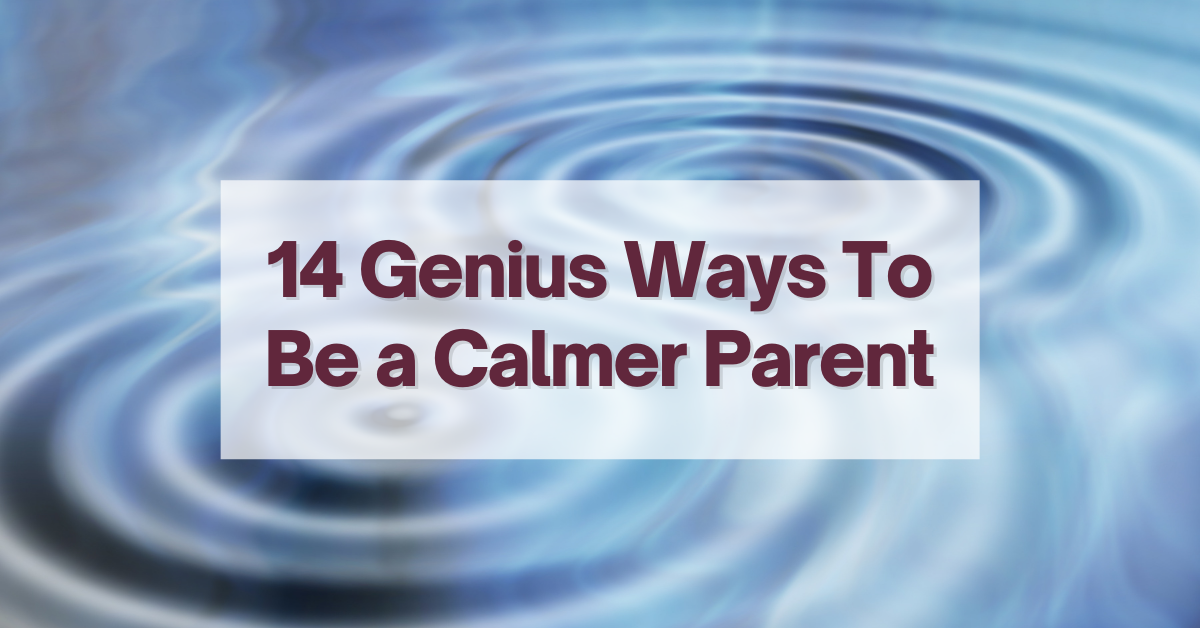
14 Genius Ways To Be a Calmer Parent
Kick the habit of yelling and become a calmer parent.
There are many different parenting styles, but they all have one thing in common: zeroing in on what’s best for the kids.
One of these styles can be better described as calm parenting.
But, what is a calm parent?

Meditating in silence while your kids fight or make a disaster?
Not quite.
Keep reading to see what the science says about yelling at your children and discover 14 genius ways to avoid being the kind of parent you don’t want to be.
Does Yelling at Your Child Hurt Them Long-Term?
The answer is a definite yes.
Research has shown that yelling at a child has long-term psychological effects such as increased anxiety, aggression, and depression, among several other negative effects.
Knowing this, it’s never been more crucial to learn how to be a better parent—with less yelling and more patience.
I’m a father of two young girls, ages 8 and 6, who love to play together, but they also argue, fight, and compete against each other constantly.
They’re the most amazing little human beings I’ve ever known, but after a long day of teaching elementary and middle school kids, my patience hits its limit.
My confession? I know what it’s like to lose your composure and yell at your kids.
It doesn’t feel good and soon after, you wonder: isn’t there a better way to approach this recurring issue?
Because of this very question, my wife and I make a conscious effort to be peaceful parents who actively engage in calm parenting.
So, what’s the secret?
So You’ve Made the Decision To Be a Calmer Parent
Once you have made the decision to be a calm parent, learning how to do it is easier than it looks. These days there are endless learning tools for parents who understand the importance of calm parenting. From books to podcasts, and from apps to blogs such as this one, you have plenty of options available to learn tips for parents and create your own toolkit to keep calm for your kids.
It’s a good time to be a calm parent and I really hope that the following tips can help you achieve that goal.
14 Genius Ways To Be a Calmer Parent
I’m including in this list techniques for calming down when the patience has already been lost and you’re about to snap, but also long-term techniques to help you live a calmer family life.
1. Get a Timeout (For Yourself!)
Raise your hand if you’ve ever given your kid a timeout! I certainly did, many times. Until one day I noticed that the one needing a timeout was myself. Kids are kids and they will always have annoying discussions about meaningless things, or at least that’s how they seem for us as adults.
If your patience is running out hearing them arguing, visualize your favorite football coach asking for a timeout and ask one for yourself. Get up, take a deep breath, and leave the room.
Odds are that the situation is more about your own stress, than your children’s behavior.
2. Say a Mantra
Memorize and repeat a calming mantra of choice to avoid yelling at your children.
Studies have shown that repeating a mantra can calm the brain. Called “the secret to calm parenting,” it isn’t only about the mantra, but the pause. In reality, it’s a timeout with a distraction—since the mantra keeps you focused on something else.
Your mantra can be something as simple as “choose kindness” or “love is the way,” and it can take you back to the moment you made your conscious decision to become a calm parent, reminding you why this is so important.
3. Identify Your Feelings
Why are you about to explode? Is it because your kids are fighting over a meaningless toy?
Or perhaps it has to do with your bad day at work?
Your reason to be mad can be a valid one, and it’s quite possible that your children really need a reprimand. The key is to identify the source of your feelings before you respond to the situation.
Simply put, your kids trigger feelings already within you—they aren’t the cause of the feeling.
By identifying your feelings, you act in a responsible way towards them and get yourself in position to give your children the guidance or discipline they really need at that moment.
Who Is Homeschool Spanish Academy?
We’re an online Spanish school committed to empowering parents and their children to live happier lives, enjoy stronger learning outcomes, and experience real success.
Learn more about our classes.
4. Use the CALM Method for Communication
This technique helps parents to communicate with their children and its goal is “to give children a voice and help them feel heard.” CALM stands for:
- Connect: avoid distractions and give your full attention to your child.
- Affect: show your emotions and let your kids know that you understand them.
- Listen: really listen to what your kids have to say, and ask for clarification if needed.
- Mirroring: share in your child’s thoughts and feelings.
By using CALM techniques, you build a stronger relationship with your child, which helps you to understand why they act the way they do. Ultimately, this fills your family dynamic with compassion and, not surprisingly, empowers you to have more patience for your kids.
5. Focus on the Big Picture
You love your kids more than anything else in the world. Remember that. Focus on how good they are most of the time and how proud you are of them.
At the end of the day, does it really matter if your children picked up their toys after playing with them?
(I know it matters—I hate when they leave them strewn across the living room and I stomp on them barefooted.)
The real question is:
Is it necessary for you to yell at them about the toys, when you’re well aware of the negative, long-term effects this has on their mind and life experience?
That is the question.
Keep things in perspective and focus on the big picture: you want to guide your children with patience, not destroy them with anger.
Hear Your Child Speak Spanish! Your Free Trial Class Is Waiting
6. Get On Your Child’s Level
I mean this both physically and emotionally. Adults can be imposing figures, especially when speaking with an authoritarian tone and looking down at the child from above.
Instead, get on your knees and position yourself under your child’s line of sight. Talk to them as an equal.
This will help them feel empowered instead of threatened. Now you’re ready to get at their same level emotionally.
It’s amazing how something as simple as getting low can calm down an explosive situation.
7. Explore the TEAM Parenting Method of Cooperation
The TEAM method of calmer parenting “minimizes conflict and foster cooperation.” It stands for:
- Togetherness
- Encouragement
- Autonomy
- Minimal interference.
It’s about “building self-sufficiency and confidence,” while focusing on collaboration, teamwork, and autonomous exploration.
TEAM parenting teaches kids “how to work together with their family,” because the idea is that cleaning up, cooking dinner, or watering the plants—to name just a few home tasks—is a shared responsibility of every member in the family.
I find this approach interesting and in line with what we do at our home. For example, every second Saturday the four of us (wife, two kids, and myself) work in the garden together. The girls rake and water or harvest (depending on the time of year), while their mom and I do the more complicated tasks.
They’re also responsible for watering the plants in flower pots—and while I worry they’re not using the right amount of water—ultimately, I step back to let them observe the outcomes of putting too much or too little water so we can discuss the solutions for next time.

8. Allow Your Child To Make Mistakes
How many times have you seen your child do something “the wrong way” and you feel an overwhelming urge to correct them?
This happens to me all the time.
From folding their clothes to feeding the pets, I can easily see a “better way” to do those tasks and try to teach them “my way.”
But the truth is that kids learn better by making their own mistakes.
That’s life, isn’t it? If you never allow them to make mistakes, you’re taking away from them the possibility of learning important lessons by themselves.
9. Identify Your Triggers and Write Them Down
It’s important for us parents to manage our reaction to stress. The best way to do this is to identify what triggers you and write those specific reasons or situations down.
When you’re aware of them, they no longer control you—which means you’re less likely to start yelling at your kids without thinking about how they’ve triggered this response.
A trigger can be many different things, such as:
- being ignored by your kids
- being constantly interrupted
- one of your kids being mean to another one
What’s triggered you in the past is likely to trigger you again. By recognizing this and writing them down, you’ll be more conscious of what leads you to losing your patience (and temper) with your child.
10. Meditate or Do Yoga
I’m a big believer in meditation, which is touted as “a simple, fast way to reduce stress.”
While it may not be for everyone, you could try practicing yoga for a similar effect.
Remember what I said about managing your reaction to stress better? It should be a top priority for each of us parents who wish to be calmer.
By reducing stress, you’ll not only be a calmer parent, but a calmer spouse, and an overall calmer human being.
Nowadays, the best part is you don’t even need to leave your house to meet a meditation guru—there’s an app for that.
11. Create Crystal-Clear House Rules
As a teacher, I do this at school with my students. Every time I get a new group, I allow the students to write the rules, which empowers them to feel like they “own” the rules and ultimately compels them to actually follow them.
Ask your kids to define the house rules as they currently exist. Which rules are they aware of? Then have them brainstorm more rules that would add structure and healthy boundaries to the household.
Trust me, this will make a huge difference in the way your whole family dynamics work.
By being crystal clear about what’s allowed and what isn’t at home, you’re limiting the spectrum of possible conflicts.
12. Enjoy Physical Exercise
Similar to meditation and yoga, exercising helps you clear your mind from the stress of daily life.
When you’re running, working out, or riding your bicycle, you oxygenate your body and refresh your mind. The Harvard Medical School recognizes that doing exercise helps to reduce stress.
13. Modify Your Expectations
The expectations you have about your children help to determine how you react to their actions.
Sometimes, we parents don’t realize that either our expectations are too high or that our kids are different from what we had in mind.
Think about your expectations for your kids and keep adapting them, adjusting them as your child grows and you learn more about them as they change.
14. Get a Relaxing Hobby
Hobbies are no joke! They focus your attention on the task at hand and stop you from thinking about your other worries.
I’ve found gardening a calming and peaceful hobby, but reading books or doing puzzles are also great examples of relaxing hobbies that help you to better manage the high levels of stress common to modern life.
You’ve Got What It Takes To Become a Calmer Parent
If you really want to become a calm parent and keep a more harmonic atmosphere at home, try following one or a few of these useful techniques. Find the right ones for you and see how they work with your own family.
We all want the best for our children, and becoming a calmer parent is a big advantage for the well-being of your family life. You’ll help your children to avoid developing anxiety and it will also reduce their levels of stress—just as much as yours!
Explore More Content for Parents:
- How to Help Your Child Speak Spanish with Confidence (Without Feeling Embarrassed!)
- Give Your Child a Head Start—Without Overloading Their Schedule
- Busy Parent’s Guide: Fitting Online Spanish Lessons into Your Child’s Schedule
- How to Keep Up with Spanish During Breaks and Vacations
- Summer Family Activities: Tips and Ideas for The Whole Family
- 50 Useful Spanish Transition Words for Everyday Speech and Writing - January 30, 2025
- Master the 18 Spanish Tenses (and Take Our Cheat Sheet With You) - January 23, 2025
- A Guide to Double Negatives in Spanish - December 18, 2024





